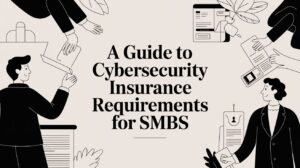In the dynamic landscapes of Pittsburgh and Youngstown, small and midsize businesses are navigating an era of unprecedented digital connectivity—and with it, escalating cyber risks. Phishing attacks prevention is crucial for safeguarding your operations against these deceptive threats that aim to steal sensitive information. At Eagle Point Technology Solutions (eaglepointtech.com), our mission is to equip these local enterprises with cutting-edge defenses against sophisticated threats. Drawing from extensive experience in the cybersecurity realm, I’ve partnered with countless SMBs to build resilient IT infrastructures that stand strong amid evolving dangers.
In today’s interconnected world, cybersecurity for small businesses isn’t just a luxury—it’s a necessity. Whether you’re running a local retail shop in Pittsburgh or a manufacturing firm in Youngstown, the rise of remote work and digital transactions has made your operations more vulnerable than ever. Phishing attacks, in particular, represent one of the most common and insidious forms of cyber threats, preying on human error to breach systems and steal sensitive data.
At Eagle Point Technology Solutions, we specialize in IT solutions Pittsburgh businesses rely on, from network security to cloud management, and as a cybersecurity expert Youngstown entrepreneurs trust, I’ve seen firsthand how these attacks can devastate unprepared companies. This blog post dives deep into what phishing attacks are, why they pose such a significant risk to small and midsize businesses (SMBs), and most importantly, how to prevent them with effective phishing attacks prevention strategies. By the end, you’ll have actionable insights to enhance your cybersecurity posture. Remember, robust cybersecurity measures aren’t about fear-mongering; they’re about empowering your business to thrive securely.
Understanding Phishing Attacks: The Basics
Phishing attacks are a type of social engineering scam where cybercriminals impersonate trustworthy entities to trick individuals into revealing confidential information, such as login credentials, financial details, or personal data. These attacks often arrive via email, but they can also come through text messages, phone calls, or even social media. The term “phishing” is a play on “fishing,” as attackers cast a wide net with baited hooks, hoping to lure unsuspecting victims.
For small businesses in Pittsburgh and Youngstown, where many operations rely on email for daily communications, understanding the mechanics of phishing is crucial. Imagine receiving an email that looks like it’s from your bank, urging you to click a link to verify your account due to suspicious activity. That link leads to a fake website designed to capture your details. This is classic phishing, and it’s alarmingly effective because it exploits trust and urgency.
According to experts, phishing attempts to trick people into giving up personal or sensitive information by mimicking legitimate sources.eaglepointtech.com In my experience at Eagle Point Technology Solutions, we’ve handled cases where a single phishing email led to data breaches costing businesses thousands in recovery efforts. Cybersecurity for small businesses must start with awareness: recognize that anyone can be targeted, from entry-level employees to executives.
Phishing isn’t new—it dates back to the 1990s—but its sophistication has grown with technology. Today, attackers use AI to craft personalized messages, making them harder to spot. For IT solutions Pittsburgh providers like us, educating clients on these basics is the first line of defense.
Common Types of Phishing Attacks
Not all phishing attacks are created equal. Understanding the variations helps in tailoring prevention strategies. Here are the most prevalent types affecting SMBs:
- Email Phishing: The most common form, where fraudulent emails mimic reputable organizations. These might claim your account is compromised or offer a too-good-to-be-true deal. Prevention involves scrutinizing sender addresses and avoiding unsolicited attachments.
- Spear Phishing: This targeted approach personalizes attacks using information about the victim, such as their name or job role. For a Youngstown manufacturing business, it could be an email posing as a supplier requesting updated payment details. As a cybersecurity expert Youngstown-based, I’ve seen spear phishing succeed because it feels legitimate.
- Whaling: A subset of spear phishing aimed at high-level executives, like CEOs. These “big fish” attacks often involve requests for wire transfers or sensitive corporate data.
- Smishing and Vishing: Smishing uses SMS texts, while vishing employs voice calls. A text claiming to be from the IRS demanding immediate action is smishing. These are rising in popularity due to mobile device ubiquity.
- Pharming: Redirects users from legitimate websites to fraudulent ones via DNS poisoning. Less common but devastating for e-commerce businesses.
- Clone Phishing: Duplicates a legitimate email you’ve received before, but with malicious links or attachments inserted.
Each type underscores the need for comprehensive cybersecurity for small businesses. In Pittsburgh, where tech adoption is growing among SMBs, ignoring these variations can lead to severe consequences. Reference articles like those from Varonis detail how phishing uses fraud to open malware or reveal info. (Link: Varonis on Phishing Attacks)
The Impact of Phishing on Small and Midsize Businesses
For small and midsize businesses in Pittsburgh and Youngstown, phishing isn’t just an annoyance—it’s a potential business killer. The effects can be paralyzing, with 88% of security professionals reporting increased attacks. Financial losses are immediate: stolen credentials can lead to unauthorized transactions, ransomware deployment, or data theft sold on the dark web.
Consider the ripple effects. A successful phishing attack might result in downtime, where your systems are locked until a ransom is paid. For a Pittsburgh retail business, this means lost sales during peak hours. In Youngstown’s industrial sector, it could halt production lines. Beyond finances, there’s reputational damage—if customer data is compromised, trust erodes, leading to lost clients and legal liabilities under regulations like GDPR or CCPA.
Small businesses are prime targets because they often lack robust defenses compared to larger corporations. Statistics show that phishing accounts for over 90% of data breaches, and SMBs recover slower due to limited resources.eaglepointtech.com At Eagle Point Technology Solutions, we’ve assisted clients post-attack, implementing IT solutions Pittsburgh businesses need to bounce back. The average cost of a breach for SMBs exceeds $25,000, not including long-term effects like increased insurance premiums.
Moreover, in regions like Pittsburgh and Youngstown, where economic recovery is ongoing, a phishing-induced setback can threaten jobs and community stability. Emphasizing robust cybersecurity measures is key to mitigating these risks. For a foundational understanding, refer to our earlier post: Introduction to Cybersecurity for Small Businesses.
How to Prevent Phishing Attacks: Practical Strategies
Prevention is always better than cure, especially in cybersecurity for small businesses. Here’s a comprehensive guide to safeguarding your operations with phishing attacks prevention:
1. Employee Training and Awareness
The human element is the weakest link. Conduct regular phishing awareness training sessions. Simulate attacks to test responses—tools like KnowBe4 can help. Educate on red flags: unexpected emails, poor grammar, urgent demands. As a cybersecurity expert Youngstown, I recommend monthly refreshers for all staff.
2. Implement Advanced Email Filtering
Use email gateways with AI-driven filters to block suspicious messages. Solutions like Microsoft Defender or Proofpoint scan for malicious links and attachments. For IT solutions Pittsburgh, we integrate these into client systems for proactive protection.
3. Enable Multi-Factor Authentication (MFA)
MFA adds a layer of security, requiring a second verification step. Even if credentials are phished, access is denied without the secondary factor. Make it mandatory for all accounts.
4. Keep Software Updated
Outdated software is a phishing gateway. Automate updates for operating systems, browsers, and antivirus programs. Patch management is crucial—unpatched vulnerabilities are exploited in 60% of breaches.
5. Use Secure Connections and VPNs
Encourage VPN use for remote workers, especially in Pittsburgh’s hybrid work environments. Avoid public Wi-Fi without encryption.
6. Develop an Incident Response Plan
Have a plan: who to contact, how to isolate affected systems. Regular drills ensure readiness. Reference resources from SentinelOne on preventing phishing for SMBs. (Link: SentinelOne on Phishing Prevention)
7. Monitor and Audit Regularly
Employ monitoring tools to detect anomalies. Regular audits reveal weaknesses. At Eagle Point, we offer managed services for continuous vigilance.
8. Partner with Experts
Don’t go it alone. As providers of IT solutions Pittsburgh and cybersecurity expert Youngstown, we customize defenses, from firewalls to endpoint protection.
These strategies, when implemented, significantly reduce phishing risks. For small businesses, investing in prevention saves far more than recovery costs. Build on this by exploring our post on Understanding the Importance of IT Security Compliance for Businesses of All Sizes.
The Role of Professional IT Solutions in Combating Phishing
While DIY measures help, professional assistance elevates your defenses. At Eagle Point Technology Solutions, we offer tailored cybersecurity for small businesses, including vulnerability assessments and 24/7 monitoring. For Pittsburgh clients, our IT solutions include seamless integration with existing infrastructure. Youngstown businesses benefit from our local expertise, ensuring compliance with industry standards.
We’ve helped numerous SMBs prevent attacks through proactive measures. If you’re unsure where to start, a consultation can identify gaps.
Conclusion: Take Action Today
Phishing attacks are a persistent threat, but with knowledge and robust cybersecurity measures, small and midsize businesses in Pittsburgh and Youngstown can protect themselves effectively. Remember, prevention starts with awareness and ends with action.
To enhance your cybersecurity, schedule a free consultation with us today. Visit our contact page at https://eaglepointtech.com/contact/ to get started. Don’t wait for an attack—fortify your business now.
For further reading, check out these reference articles:
- PurpleSec on Phishing Attacks
- OVIC on Protecting Against Phishing
- CMIT Solutions on Business Protection
Since our cybersecurity blog category is building, stay tuned for more insights at https://eaglepointtech.com/category/cybersecurity/. For related topics, see The Hidden Dangers of USB Cables and Ports: Protecting Your Devices from Malware and Play Ransomware: A Comprehensive Analysis of a Global Cyber Threat.




